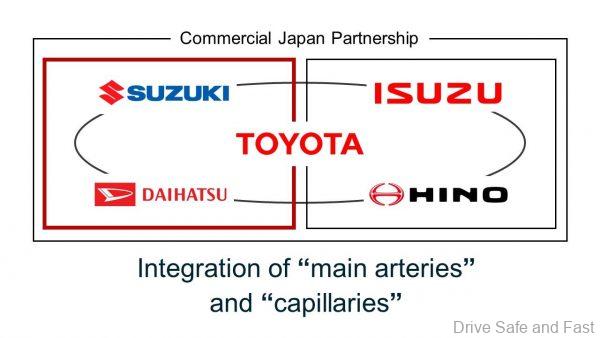Suzuki And Daihatsu Just Agreed On One Thing
When it comes to bitter rivalries in the car industry, the one between Suzuki and Daihatsu probably doesn’t immediately spring to mind. However, in Japan, these two are constantly at each others’ throats. While both are giants in their own right, these motor companies are primarily focused on very small automobiles. Hence, they often find themselves in direct competition with each other. However, this week, they came to an agreement on something.

The two companies have decided to work together under Toyota’s “Commercial Japan Partnership Technologies” or CJP. This, to us, is further evidence that the Japanese car industry is splitting into two camps: those working within Toyota’s framework and those working under Nissan’s.

President of Toyota 
President of Daihatsu 
President of Suzuki 
President of CJP
Under this new agreement, both Suzuki and Daihatsu are each acquiring 10% of Commercial Japan Partnership Technologies. The aim of this new company is to develop shared CASE technologies.

This area of cooperation concerns mini-commercial vehicles developed by Suzuki and Daihatsu. Over 78 million exist today in Japan and they’re especially important in rural areas of Japan. Working together using the foundations of the CJP will enable the promotion of improved integrated logistics efficiency. It will allow for affordable advanced safety technologies and electrification for minivehicles.

What are CASE technologies?
Vehicles of today and the future are being developed on CASE principles. CASE stands for:
Connected: Meaning the vehicle is designed to be connected to the internet
Autonomous: Meaning the vehicle has some degree of automated driving abilities
Shared: Meaning the ability to utilise the vehicle more often by using a subscription or sharing model to ownership
Electrified: Meaning the vehicle and/or its systems are powered by electricity

CASE technologies work better when they are unified to a certain degree. Like all other technologies that require a lot of R&D funding, sharing the load is always beneficial. A lot of the groundwork for CASE technologies were developed by Toyota, and further refined for commercial use under CJP by Isuzu and Hino.

Why are CASE technologies important?
The end goal of joining the CJP and implementing CASE technologies for mini commercial vehicles will:
- Improve logistics efficiency by building a connected-technology infrastructure that links the main arteries of logistics (truck logistics) with the capillaries of logistics (mini-commercial vehicles)
- Expand from commercial vehicles to minivehicles the use of advanced safety technologies that contribute to safety and security
- Improve cooperation on the use of technologies for the electrification of affordable, high-quality minivehicles that can be sustainably disseminated
Company outline of Commercial Japan Partnership (CJP) Technologies (at the end of July 2021)
| Name | Commercial Japan Partnership Technologies Corporation |
| Location | 1-4-18 Koraku, Bunkyo-ku, Tokyo |
| Capitalization | 10 million yen (Capital structure: Toyota 60 percent, Isuzu 10 percent, Hino 10 percent, Suzuki 10 percent, Daihatsu 10 percent) |
| Representative director | Hiroki Nakajima, president (President of Toyota Motor Corporation’s in-house CV Company) |
| Start of operations | April 1, 2021 |
| Principal line of business | Planning CASE technologies and services for commercial vehicles |



